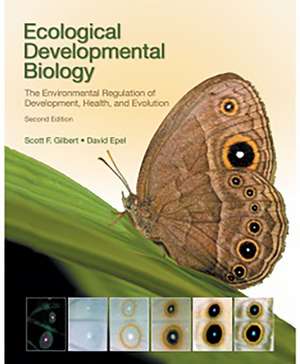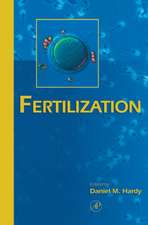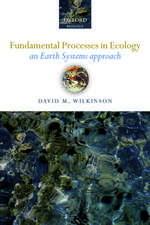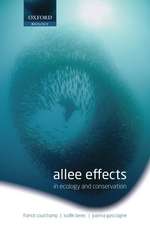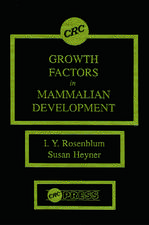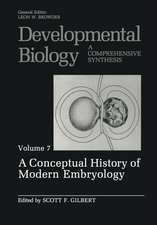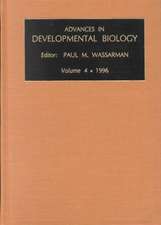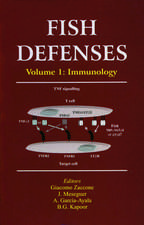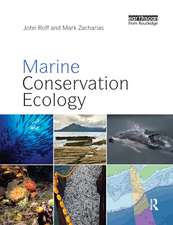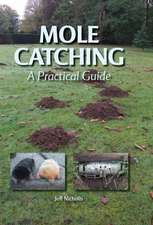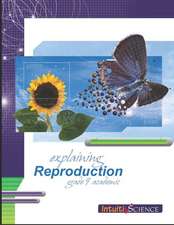Ecological Developmental Biology: The Environmental Regulation of Development, Health, and Evolution
Autor Scott F. Gilbert, David Epelen Limba Engleză Paperback – 23 iun 2015
| Toate formatele și edițiile | Preț | Express |
|---|---|---|
| Paperback (2) | 373.55 lei 19-30 zile | +30.93 lei 999-0 zile |
| Sinauer Associates Inc.,U.S. – 24 feb 2009 | 373.55 lei 19-30 zile | +30.93 lei 999-0 zile |
| Oxford University Press – 23 iun 2015 | 793.49 lei 22-36 zile |
Preț: 793.49 lei
Preț vechi: 1086.96 lei
-27% Nou
Puncte Express: 1190
Preț estimativ în valută:
151.88€ • 165.03$ • 127.66£
151.88€ • 165.03$ • 127.66£
Carte disponibilă
Livrare economică 31 martie-14 aprilie
Preluare comenzi: 021 569.72.76
Specificații
ISBN-13: 9781605353449
ISBN-10: 1605353442
Pagini: 576
Dimensiuni: 254 x 203 x 31 mm
Greutate: 1.5 kg
Ediția:2
Editura: Oxford University Press
Colecția OUP USA
Locul publicării:New York, United States
ISBN-10: 1605353442
Pagini: 576
Dimensiuni: 254 x 203 x 31 mm
Greutate: 1.5 kg
Ediția:2
Editura: Oxford University Press
Colecția OUP USA
Locul publicării:New York, United States
Recenzii
This second edition, written by two of its pioneers, serves as a primer to the field and is intended for advanced undergraduate students, although it is equally appropriate for graduate students, faculty, and the broader public. The book is written in an engaging, clear, accessible prose, and richly illustrated with hundreds of high-quality images and graphs. This is a well-written and valuable volume, which deserves to be not just on bookshelves, but to be read by anyone interested in why and how development and evolution unfold the way they do.
The degree to which genetics and the environment affect organismal development is an important question. Ecological Developmental Biology articulates this topic for today's researcher by integrating modern environmental issues such as climate change and pollution with disparate fields of modern biology. Ecological Developmental Biology is a good companion for the undergraduate or graduate interested in dwelling not only at the crossroads of molecular and ecological-based biology, but also in fields of public policy and philosophy.
This is an ambitious, largely successful incorporation of new discoveries and rediscoveries into biology. The book is aimed at students and professionals who wish to understand their subdisciplines in a broader ecological, evolutionary, and social context.
This is a book that deserves to be read. It presents complex information clearly and engagingly, in context and with the citations of the primary literature that an instructor needs to add depth to a topic.
The degree to which genetics and the environment affect organismal development is an important question. Ecological Developmental Biology articulates this topic for today's researcher by integrating modern environmental issues such as climate change and pollution with disparate fields of modern biology. Ecological Developmental Biology is a good companion for the undergraduate or graduate interested in dwelling not only at the crossroads of molecular and ecological-based biology, but also in fields of public policy and philosophy.
This is an ambitious, largely successful incorporation of new discoveries and rediscoveries into biology. The book is aimed at students and professionals who wish to understand their subdisciplines in a broader ecological, evolutionary, and social context.
This is a book that deserves to be read. It presents complex information clearly and engagingly, in context and with the citations of the primary literature that an instructor needs to add depth to a topic.
Notă biografică
Scott F. Gilbert, a Senior Research Associate at Swarthmore College and the Finland Distinguished Professor at the University of Helsinki Institute of Biotechnology, teaches developmental biology, developmental genetics, and the history of biology. After receiving his B.A. from Wesleyan University, he pursued his graduate and postdoctoral research at The Johns Hopkins University and the University of Wisconsin. Dr. Gilbert is the recipient of several awards, including the first Viktor Hamburger Award for excellence in developmental biology education, the 2004 Alexander Kowalevsky Prize for evolutionary developmental biology, honorary degrees from the Universities of Helsinki and Tartu, and the Medal of François I from the Collège de France.David Epel is the Jane and Marshall Steel Jr. Professor Emeritus of Biological Sciences at Stanford University's Hopkins Marine Station in Pacific Grove CA. He did his undergraduate studies at Wayne State University and then graduate and postdoctoral studies at the University of California, Berkeley and the University of Pennsylvania. Dr. Epel has been a Guggenheim Fellow, is a Fellow of the American Association for the Advancement of Science, the California Academy of Sciences, and an Overseas Fellow of Churchill College and Life Fellow of Clare Hall at the University of Cambridge. His honors include the Cox Medal for Fostering Undergraduate Research at Stanford and the Ed Ricketts Memorial Award for Lifetime Achievement in the Marine Sciences. Epel's research focused on cell biology of development, especially the activation of the egg at fertilization, the unique physiology of the embryo and the cellular mechanisms of embryo protection.
Cuprins
PART I: ENVIRONMENTAL SIGNALS AND NORMAL DEVELOPMENT
The Environment as a Normal Agent in Producing Phenotypes
How Agents in the Environment Effect Molecular Changes in Development
Developmental Symbiosis: Co-Development as a Strategy for Life
Embryonic Defenses: Survival in a Hostile World
PART II: ECOLOGICAL DEVELOPMENTAL BIOLOGY AND DISEASE STATES
Teratogenesis: Environmental Assaults on Development
Endocrine Disruptors
The Epigenetic Origin of Adult Diseases
PART III: TOWARD A DEVELOPMENTAL EVOLUTIONARY SYNTHESIS
The Modern Synthesis: Natural Selection of Allelic Variation
Evolution through Developmental Regulatory Genes
Environment, Development, and Evolution: Toward a New Synthesis
CODA: Philosophical Concerns Raised by Ecological Developmental Biology
APPENDX A: Lysenko, Kammerer, and the Truncated Tradition of Ecological Developmental Biology
APPENDIX B: The Molecular Mechanisms of Epigenetic Change
APPENDIX C: Writing Development Out of the Modern Synthesis
APPENDIX D: Epigenetic Inheritance Systems: The Inheritance of Environmentally Induced Traits
Caracteristici
- First textbook of its kind: introduces a new field of Biology that is currently lacking a textbook
- The coverage provided intersects numerous disciplines
- Provides new and important perspectives on Ecology, Conservation Biology, Cancer Biology, Ageing Research, Medicine, and Evolution
- Allows students to approach the study of nature in a new way
